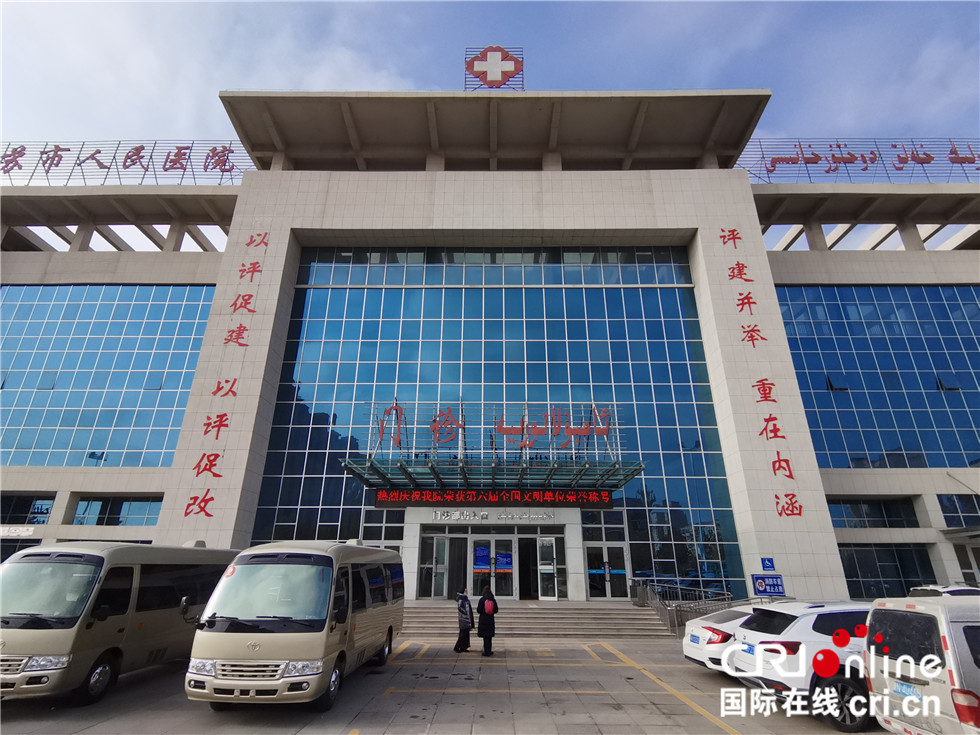
Outpatient building of Aksu People's Hospital
International Online Report (reporter Eva Papaz translated by Li Yueqiao): The Xinjiang Uyghur Autonomous Region is rich in natural resources, which have been used to treat many different diseases since ancient times. Today, the local modern hospital integrating Traditional Chinese and Western medicine is able to provide a variety of treatments according to the needs of each patient.
In Aksu, one of the westernmost cities in Xinjiang, we had the opportunity to visit one of the hospitals and interact with the doctors. Gulizar Musa, president of Aksu People's Hospital, received us warmly, introduced us to the hospital and gave us an interview.
Growing up in a Uighur family in a small village in the Aksu region, Gulzar Musa is well informed about the local situation and needs. She worked very hard in school, and was admitted to Xinjiang Medical University with excellent grades, studying with classmates from 14 different ethnic groups. After studying there for 5 years, she returned to her hometown and was first assigned to the local CDC and then transferred to the local hospital. In her career of more than 30 years, she has traveled to Beijing, Shanghai, Hangzhou and other major cities in mainland China for training.
With a population of more than 2 million, of which the city of Aksu has a population of more than 700,000, it was not easy to meet all the needs of its residents in the past. However, in recent years, with the tremendous efforts made by the central and local governments to eradicate poverty, the region has developed rapidly in various fields.
Among them, the development of the medical field is crucial to prevent people from becoming poor due to illness, so the government has introduced special policies to solve the relevant problems. President Gulizar Musa specifically mentioned that Hangzhou, a city in eastern China that supported Aksu City, has sent several batches of medical experts to Aksu People's Hospital, which has greatly improved the medical level and service level of the hospital. In addition, in addition to regularly dispatching medical experts to Aksu People's Hospital, Hangzhou also funded the construction of a rehabilitation center building for the hospital. The building is well-equipped, including state-of-the-art rehabilitation facilities for the disabled, as well as a fully equipped children's activity room for cerebral palsy.
Nowadays, for patients who need special treatment, the hospital can invite experts from foreign hospitals to diagnose and treat patients, rather than transferring patients to big cities in the mainland as in the past, for example, according to the president, in the past two years, experts from Hangzhou have come to treat more than 60 local scalded children, of which a 13-year-old girl who had a severely scalded nose to almost disfigurement some time ago has basically recovered, and this little girl is not to mention how happy she is.
President Gulzar Musa also showed us how the hospital's doctors can diagnose and treat remotely via video link. At the local health clinic in each village, patients can communicate online with experts from the Municipal People's Hospital according to their own needs, which saves villagers time and transportation costs on the road.
Today, at the Aksu People's Hospital, there is also a Chinese medicine studio, and the cost of treating fractures is much lower than that of Western medicine.
The hospital also responds to the call for health poverty alleviation by providing free routine health check-ups to all local residents every year, and regularly organizes volunteers to visit patients' homes and provide them with medical services – no matter how far away from their homes.
Under the leadership of President Gulizar Musa, Aksu People's Hospital has worked hard for many years and achieved positive results, for example, there has not been a single case of new crown pneumonia in the region so far, and the number of patients with chronic diseases has also shown a downward trend, which is inseparable from the hospital's vigorous epidemic prevention publicity and health education for the masses.
Today's visit and interview with Aksu People's Hospital gave me a deeper understanding of how China today strives to eliminate poverty through various practical measures from the perspective of health poverty alleviation.
Some of the doctors were built
Doctors make remote diagnoses
Rehabilitation room for the disabled
Activity room for children with cerebral palsy
Dean Gulzar Musa (left) is interviewed by journalist Eva Papaz